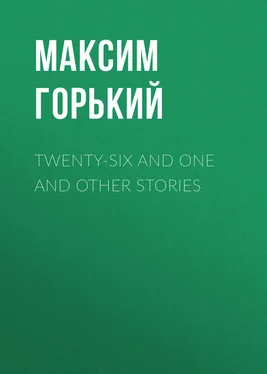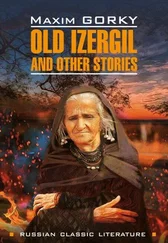Максим Горький - Twenty-six and One and Other Stories
Здесь есть возможность читать онлайн «Максим Горький - Twenty-six and One and Other Stories» — ознакомительный отрывок электронной книги совершенно бесплатно, а после прочтения отрывка купить полную версию. В некоторых случаях можно слушать аудио, скачать через торрент в формате fb2 и присутствует краткое содержание. Жанр: Русская классическая проза, Классическая проза, на английском языке. Описание произведения, (предисловие) а так же отзывы посетителей доступны на портале библиотеки ЛибКат.
- Название:Twenty-six and One and Other Stories
- Автор:
- Жанр:
- Год:неизвестен
- ISBN:нет данных
- Рейтинг книги:3 / 5. Голосов: 1
-
Избранное:Добавить в избранное
- Отзывы:
-
Ваша оценка:
- 60
- 1
- 2
- 3
- 4
- 5
Twenty-six and One and Other Stories: краткое содержание, описание и аннотация
Предлагаем к чтению аннотацию, описание, краткое содержание или предисловие (зависит от того, что написал сам автор книги «Twenty-six and One and Other Stories»). Если вы не нашли необходимую информацию о книге — напишите в комментариях, мы постараемся отыскать её.
Twenty-six and One and Other Stories — читать онлайн ознакомительный отрывок
Ниже представлен текст книги, разбитый по страницам. Система сохранения места последней прочитанной страницы, позволяет с удобством читать онлайн бесплатно книгу «Twenty-six and One and Other Stories», без необходимости каждый раз заново искать на чём Вы остановились. Поставьте закладку, и сможете в любой момент перейти на страницу, на которой закончили чтение.
Интервал:
Закладка:
Maksim Gorky
Twenty-six and One and Other Stories
PREFACE
Russian literature, which for half a century has abounded in happy surprises, has again made manifest its wonderful power of innovation. A tramp, Maxime Gorky, lacking in all systematic training, has suddenly forced his way into its sacred domain, and brought thither the fresh spontaneity of his thoughts and character. Nothing as individual or as new has been produced since the first novels of Tolstoy. His work owes nothing to its predecessors; it stands apart and alone. It, therefore, obtains more than an artistic success, it causes a real revolution.
Gorky was born of humble people, at Nizhni-Novgorod, in 1868 or 1869, – he does not know which – and was early left an orphan. He was apprenticed to a shoemaker, but ran away, a sedentary life not being to his taste. He left an engraver's in the same manner, and then went to work with a painter of ikoni , or holy pictures. He is next found to be a cook's boy, then an assistant to a gardener. He tried life in these diverse ways, and not one of them pleased him. Until his fifteenth year, he had only had the time to learn to read a little; his grandfather taught him to read a prayer-book in the old Slav dialect. He retained from his first studies only a distaste for anything printed until the time when, cook's boy on board a steam-boat, he was initiated by the chief cook into more attractive reading matter. Gogol, Glebe Ouspenski, Dumas pere were revelations to him. His imagination took fire; he was seized with a "fierce desire" for instruction. He set out for Kazan, "as though a poor child could receive instruction gratuitously," but he soon perceived that "it was contrary to custom." Discouraged, he became a baker's boy with the wages of three rubles (about $1.50) a month. In the midst of worse fatigue and ruder privations, he always recalls the bakery of Kazan with peculiar bitterness; later, in his story, "Twenty-Six and One," he utilized this painful remembrance: "There were twenty-six of us – twenty-six living machines, locked up in a damp cellar, where we patted dough from morning till night, making biscuits and cakes. The windows of our cellar looked out into a ditch, which was covered with bricks grown green from dampness, the window frames were obstructed from the outside by a dense iron netting, and the light of the sun could not peep in through the panes, which were covered with flour dust.."
Gorky dreamed of the free air. He abandoned the bakery. Always reading, studying feverishly, drinking with vagrants, expending his strength in every possible manner, he is one day at work in a saw-mill, another, 'longshoreman on the quays… In 1888, seized with despair, he attempted to kill himself. "I was," said he, "as ill as I could be, and I continued to live to sell apples.." He afterward became a gate-keeper and later retailed kvass in the streets. A happy chance brought him to the notice of a lawyer, who interested himself in him, directed his reading and organized his instruction. But his restless disposition drew him back to his wandering life; he traveled over Russia in every direction and tried his hand at every trade, including, henceforth, that of man of letters.
He began by writing a short story, "Makar Tchoudra," which was published by a provincial newspaper. It is a rather interesting work, but its interest lies more, frankly speaking, in what it promises than in what it actually gives. The subject is rather too suggestive of certain pieces of fiction dear to the romantic school.
Gorky's appearance in the world of literature dates from 1893. He had at this time, the acquaintance of the writer Korolenko, and, thanks to him, soon published "Tchelkache," which met with a resounding success. Gorky henceforth rejects all traditional methods, and free and untrammeled devotes himself to frankly and directly interpreting life as he sees it. As he has, so far, lived only in the society of tramps, himself a tramp, and one of the most refractory, it has been reserved for him to write the poem of vagrancy.
His preference is for the short story. In seven years, he has written thirty, contained in three volumes, which in their expressive brevity sometimes recall Maupassant.
The plot is of the simplest. Sometimes, there are only two personages: an old beggar and his grandson, two workmen, a tramp and a Jew, a baker's boy and his assistant, two companions in misery.
The interest of these stories does not lie in the unraveling of an intricate plot. They are rather fragments of life, bits of biography covering some particular period, without reaching the limits of a real drama. And these are no more artificially combined than are the events of real life.
Everything that he relates, Gorky has seen. Every landscape that he describes has been seen by him in the course of his adventurous existence. Each detail of this scenery is fraught for him with some remembrance of distress or suffering. This vagrant life has been his own. These tramps have been his companions, he has loved or hated them. Therefore his work is alive with what he has almost unconsciously put in of himself. At the same time, he knows how to separate himself from his work; the characters introduced live their own lives, independent of his, having their own characters and their own individual way of reacting against the common misery. No writer has to a greater degree the gift of objectivity, while at the same time freely introducing himself into his work.
Therefore, his tramps are strikingly truthful. He does not idealise them; the sympathy that their strength, courage, and independence inspire in him does not blind him. He conceals neither their faults, vices, drunkenness nor boastfulness. He is without indulgence for them, and judges them discriminatingly. He paints reality, but without, for all that, exaggerating ugliness. He does not avoid painful or coarse scenes; but in the most cynical passages he does not revolt because it is felt that he only desires to be truthful, and not to excite the emotions by cheap means. He simply points out that things are as they are, that there is nothing to be done about it, that they depend upon immutable laws. Accordingly all those sad, even horrible spectacles are accepted as life itself. To Gorky, the spectacle presented by these characters is only natural: he has seen them shaken by passion as the waves by the wind, and a smile pass over their souls like the sun piercing the clouds. He is, in the true acceptation of the term, a realist.
The introduction of tramps in literature is the great innovation of Gorky. The Russian writers first interested themselves in the cultivated classes of society; then they went as far as the moujik. The "literature of the moujik," assumed a social importance. It had a political influence and was not foreign to the abolition of serfdom.
In the story "Malva," Gorky offers us two characteristic types of peasants who become tramps by insensible degrees; almost without suspecting it, through the force of circumstances. One of them is Vassili. When he left the village, he fully intended to return. He went away to earn a little money for his wife and children. He found employment in a fishery. Life was easy and joyous. For a while he sent small sums of money home, but gradually the village and the old life faded away and became less and less real. He ceased to think of them. His son Iakov came to seek him and to procure work for himself for a season. He had the true soul of a peasant.
Later he falls, like the others, under the spell of this easy, free life, and one feels that Iakov will never more return to the village.
In Gorky's eyes, his work is tainted by a capital vice. It is unsuited to producing the joy that quickens. Humanity has forgotten joy; what has he done beyond pitying or rallying suffering?.. These reflections haunt him, and this doubt of his beneficent efficacy imparts extreme sadness to his genius.
Читать дальшеИнтервал:
Закладка:
Похожие книги на «Twenty-six and One and Other Stories»
Представляем Вашему вниманию похожие книги на «Twenty-six and One and Other Stories» списком для выбора. Мы отобрали схожую по названию и смыслу литературу в надежде предоставить читателям больше вариантов отыскать новые, интересные, ещё непрочитанные произведения.
Обсуждение, отзывы о книге «Twenty-six and One and Other Stories» и просто собственные мнения читателей. Оставьте ваши комментарии, напишите, что Вы думаете о произведении, его смысле или главных героях. Укажите что конкретно понравилось, а что нет, и почему Вы так считаете.












